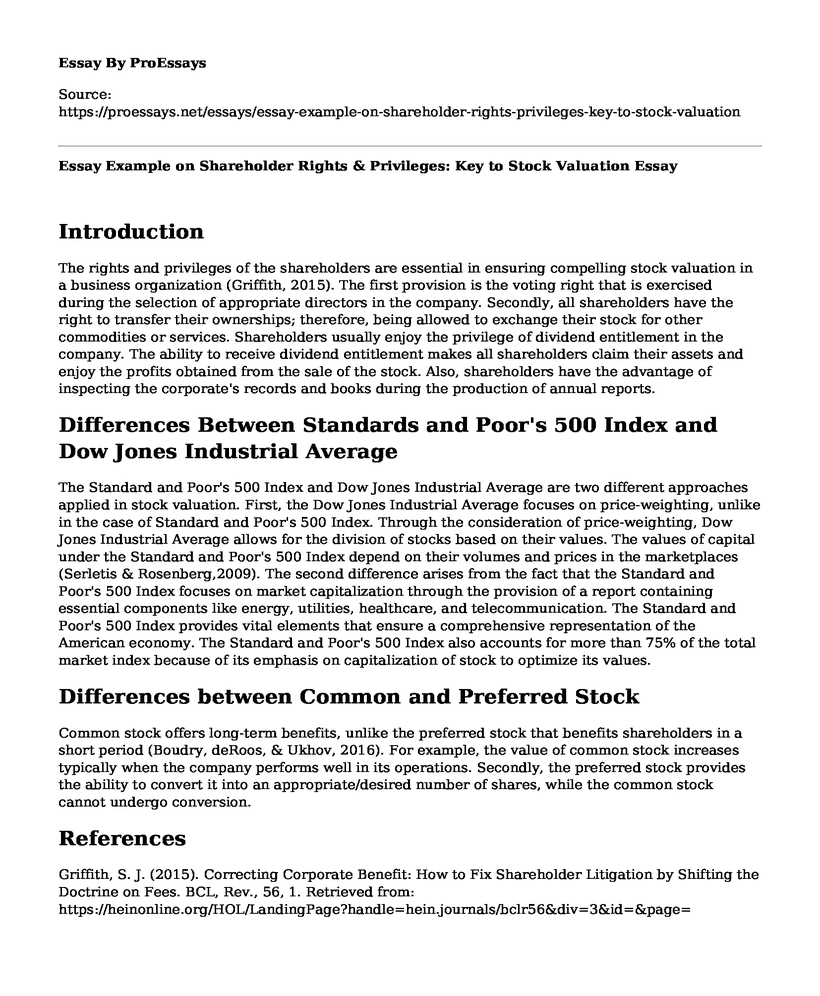Introduction
The rights and privileges of the shareholders are essential in ensuring compelling stock valuation in a business organization (Griffith, 2015). The first provision is the voting right that is exercised during the selection of appropriate directors in the company. Secondly, all shareholders have the right to transfer their ownerships; therefore, being allowed to exchange their stock for other commodities or services. Shareholders usually enjoy the privilege of dividend entitlement in the company. The ability to receive dividend entitlement makes all shareholders claim their assets and enjoy the profits obtained from the sale of the stock. Also, shareholders have the advantage of inspecting the corporate's records and books during the production of annual reports.
Differences Between Standards and Poor's 500 Index and Dow Jones Industrial Average
The Standard and Poor's 500 Index and Dow Jones Industrial Average are two different approaches applied in stock valuation. First, the Dow Jones Industrial Average focuses on price-weighting, unlike in the case of Standard and Poor's 500 Index. Through the consideration of price-weighting, Dow Jones Industrial Average allows for the division of stocks based on their values. The values of capital under the Standard and Poor's 500 Index depend on their volumes and prices in the marketplaces (Serletis & Rosenberg,2009). The second difference arises from the fact that the Standard and Poor's 500 Index focuses on market capitalization through the provision of a report containing essential components like energy, utilities, healthcare, and telecommunication. The Standard and Poor's 500 Index provides vital elements that ensure a comprehensive representation of the American economy. The Standard and Poor's 500 Index also accounts for more than 75% of the total market index because of its emphasis on capitalization of stock to optimize its values.
Differences between Common and Preferred Stock
Common stock offers long-term benefits, unlike the preferred stock that benefits shareholders in a short period (Boudry, deRoos, & Ukhov, 2016). For example, the value of common stock increases typically when the company performs well in its operations. Secondly, the preferred stock provides the ability to convert it into an appropriate/desired number of shares, while the common stock cannot undergo conversion.
References
Griffith, S. J. (2015). Correcting Corporate Benefit: How to Fix Shareholder Litigation by Shifting the Doctrine on Fees. BCL, Rev., 56, 1. Retrieved from: https://heinonline.org/HOL/LandingPage?handle=hein.journals/bclr56&div=3&id=&page=
Boudry, W. I., deRoos, J. A., & Ukhov, A. D. (2016). The Role of REIT Preferred and Common Stock in Diversified Portfolios. Retrieved from: https://scholarship.sha.cornell.edu/chrpubs/234/
Serletis, A., & Rosenberg, A. A. (2009). Mean Reversion in the US Stock market. Chaos, Solitons & Fractals, 40(4), 2007-2015. Retrieved from: https://www.sciencedirect.com/science/article/abs/pii/S0960077907008296
Cite this page
Essay Example on Shareholder Rights & Privileges: Key to Stock Valuation. (2023, Feb 23). Retrieved from https://proessays.net/essays/essay-example-on-shareholder-rights-privileges-key-to-stock-valuation
If you are the original author of this essay and no longer wish to have it published on the ProEssays website, please click below to request its removal:
- Immigration Worker Organization in a Time of Crisis Essay Example
- Two Strengths and Two Limitations of Situational Approaches to Leadership - Research Paper
- Essay Sample on Leading a Team of Social Workers to Help War Victims
- Leadership: Bridging the Gap Between Theory and Practice - Essay Sample
- Paper Example on Walmart's Structure, Systems & Strategy: A McKinsey 7S Analysis
- The Legacy of Maggie L. Walker: An Iconic Entrepreneur & Civil Rights Activist - Essay Sample
- Essay Example on Space Challenger Disaster: Engineers' Ethical Failure.







